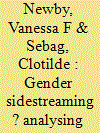| Srl | Item |
| 1 |
ID:
178500


|
|
|
|
|
| Summary/Abstract |
Twenty years after the passing of Resolution 1325, the participation of women as military personnel in peacekeeping operations remains limited. Women currently comprise just under five per cent of military personnel in UN peacekeeping missions, and the UN consistently calls for more. We contend the low numbers of female military personnel in peacekeeping reflects a lack of gender mainstreaming in national militaries globally. This article introduces the problem of sidestreaming, the practice, deliberate or unintentional, of sidelining women and relegating them to specialised spaces in international peace and security while attempting gender mainstreaming or increased gender integration. Drawing on empirical evidence from national militaries we show how and where sidestreaming occurs with the result being that women remain clustered in gendered and low-status spaces in national militaries and in specialised spaces in peacekeeping operations. This has a negative effect on retention and recruitment contributing to the low numbers of female peacekeepers in UN peace operations. We conclude that gender mainstreaming in its fullest sense will require military reform that decouples violence and combat skills from masculinity and inclusive research strategies that engage men as well as women.
|
|
|
|
|
|
|
|
|
|
|
|
|
|
|
|
| 2 |
ID:
186854


|
|
|
|
|
| Summary/Abstract |
Credibility has been used to explain theories of deterrence and cooperation in international relations. In the peacekeeping environment, for what purposes should credibility be built and how can it be signaled? Despite being listed by the UN as a success factor in peace operations, our understanding of credibility in peacekeeping remains limited and focused on deterrence. This article argues that credibility in peace operations must be built for both deterrence and cooperation purposes. Drawing on the international relations, civil war, and peacekeeping literatures, it conceptualizes credibility in peacekeeping by identifying the purposes for which credibility must be built and signaled: deterrence and cooperativeness. It contends that while a peace operation’s ability to deter is limited, signaling cooperativeness - credibility in cooperation—enables a force to cultivate cooperation with national and subnational audiences. This helps to create a more predictable security environment by enabling the force to function on a daily basis.
|
|
|
|
|
|
|
|
|
|
|
|
|
|
|
|
| 3 |
ID:
157883


|
|
|
|
|
| Summary/Abstract |
This article responds to a recent call for increased empirical evidence on the ‘local turn’ in the peacebuilding literature and discusses the impact of the international on local consent for peace operations. Using fresh empirical material this article examines the case of the United Nations Interim Force in Lebanon (UNIFIL). It shows how local perceptions of the foreign policies of peacekeeping contingents matter, and how this affects the functionality of the mission. This article highlights the heterogeneity of both United Nations peacekeeping missions and local populations, an issue that is insufficiently discussed in the literature on local engagement in peacebuilding/peacekeeping.
|
|
|
|
|
|
|
|
|
|
|
|
|
|
|
|